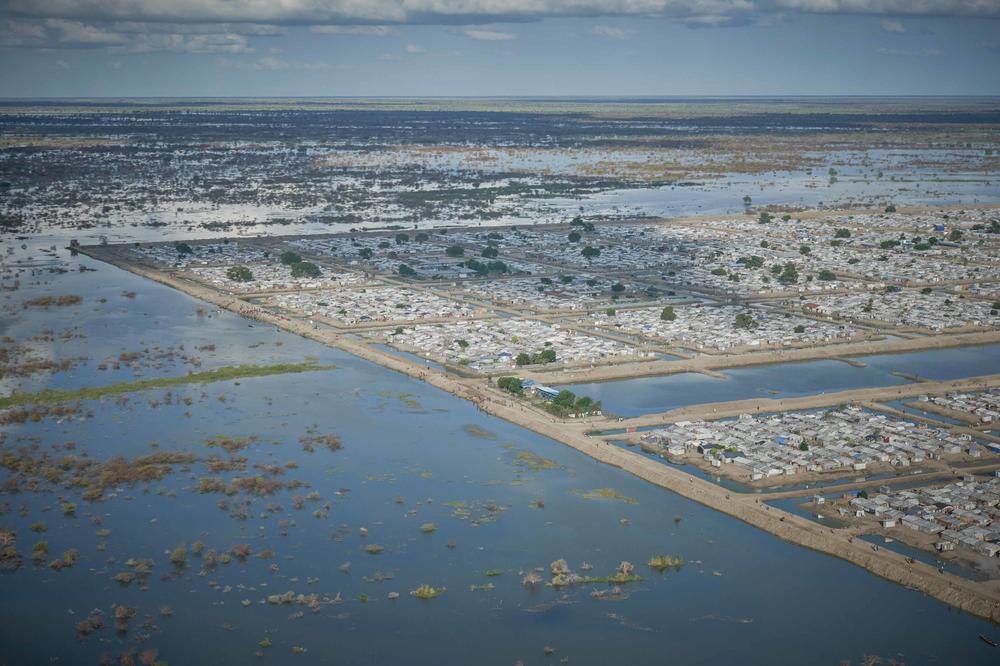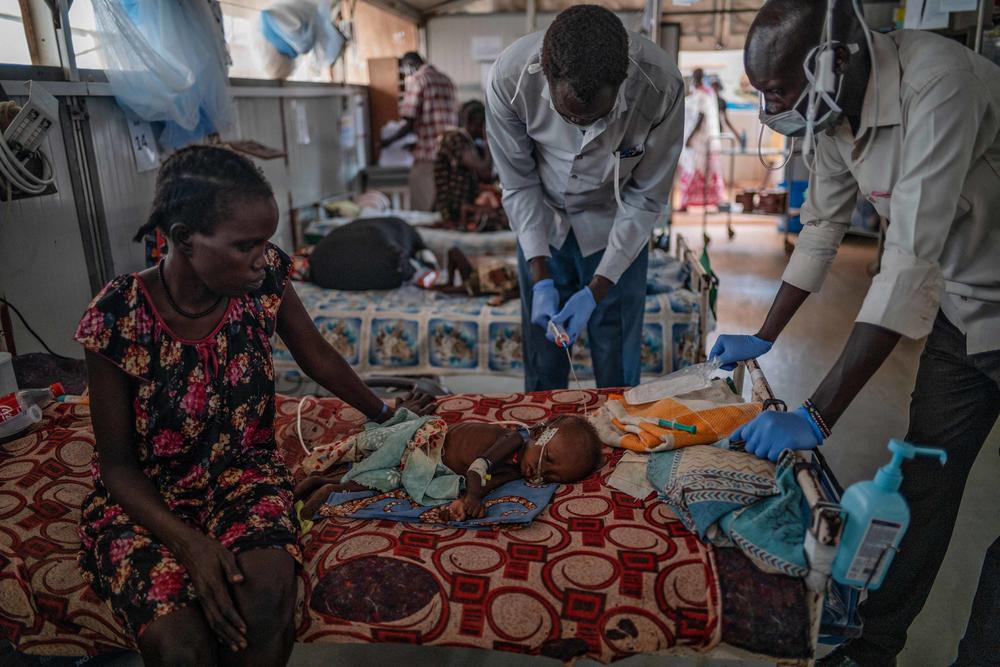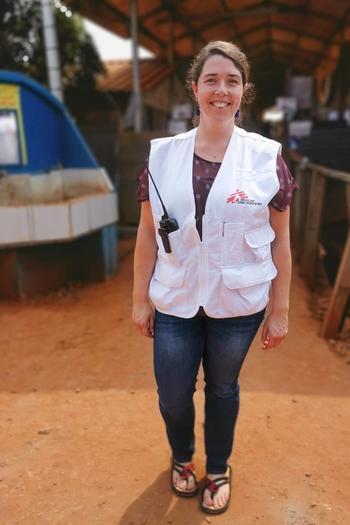“Even the Smallest Contribution Can Make a Big Difference”
Fundraising campaign for Médecins Sans Frontières at Freie Universität Berlin
Sep 18, 2023
Aerial view of the PoC site and its protective dikes in Bentiu, South Sudan. Approximately 120,000 people live here.
Image Credit: Christina Simons
As part of Freie Universität Berlin’s seventy-fifth anniversary celebrations, it has organized a special fundraising campaign: “Seventy-Five Years of Free Thinking: Celebrate and Donate” in support of the international medical relief organization Médecins Sans Frontières (MSF). Sophia Rost worked for MSF as an anesthesiologist in South Sudan until March of this year. The thirty-six-year-old tells us about the situation on the ground, what MSF is doing to help, and what is unique about the organization’s work.
Ms. Rost, you recently worked for Médecins Sans Frontières in South Sudan. What is the situation like there?
South Sudan only recently gained independence from Sudan in 2011. I was stationed in Bentiu, which is located in the north of the country. Ten years ago, a UN Protection of Civilians (PoC) site was set up in Bentiu to provide sanctuary to displaced people within the country. Today, around 120,000 people live in the camp. Many people living in the PoC site fled from the civil war that ravaged the country after independence. The situation has settled somewhat after a peace agreement was signed in 2018. Unlike in Sudan, most of the fighting in South Sudan appears to have subsided.
Nyanhial and baby Chuong. Almost all the children in the camp are malnourished.
Image Credit: Sean Sutton
Nowadays, people are fleeing their homes for a different reason. Climate change is having a tangible impact on the region, with severe flooding now an almost annual occurrence. While floods during the rainy season are nothing new in South Sudan, the intensity of the flooding over the past four years has meant that the water no longer recedes during the dry season. In many places, the protective dikes can no longer keep the floodwater out. The PoC site in Bentiu is surrounded by high dikes; the people there live one and a half meters below the water line.
What was your job at the PoC site?
I worked in the hospital – this wasn’t an actual building per se, but rather a structure made out of containers and tents. I was part of a collaborative team comprised of twenty-five to thirty-five people from around the world and more than 500 South Sudanese people. As an anesthesiologist, I was usually in the operating room – a place primarily reserved for the more serious medical emergencies.
Malaria is a big problem in the camp, as are tuberculosis and HIV. A great number of the children suffer from malnutrition. Indeed, the majority of the patients needing treatment are children – seven of the ten wards are pediatric wards. This was often hard to observe, but it was extremely rewarding when the children recovered, and you could see just how much willpower and energy they had. There were always children running around everywhere – that is one of my fondest memories of the place.
Anesthesiologist Sophia Rost worked for Médecins Sans Frontières at the PoC site in Bentiu.
Image Credit: Personal collection
What were your first impressions when you arrived?
Honestly, I was pleasantly surprised. Of course, the hospital wards are simple – one is just a container with a tarpaulin “roof” –, and there are usually fourteen beds to a ward, not including the family members staying with the patients. But there is plenty of disinfectant, and operations are carried out to a decent, albeit simple, standard. That’s important. Just because you have simpler tools at your disposal doesn’t mean that the quality of medical care has to suffer. There are also places in the camp where the workers can go for a time out. This is extremely useful when you are an anesthesiologist who is on call or on duty around the clock for three months straight.
What did you find particularly difficult during your time in Bentiu?
Communication on site was often a real challenge. The working language is officially English, but many of the patients can only speak a little English, if any. This is a problem that I sometimes have in Germany as well, but at least then I have access to a translation program or an interpreter. In Bentiu I was dependent on interpreters, and I was never sure how much of the message actually came across. The main language spoken there is Nuer – for which there are no courses or language-learning resources in Germany.
Why did you decide to get involved with MSF?
I worked on a lot of intensive care units during the Covid-19 pandemic. It was a difficult time to be working in the medical field, but it made me think about other ways that I could use my skills as an anesthesiologist to help people: namely, where people urgently need medical care and even the smallest contribution can make a big difference. I enjoy getting to know other countries and cultures; my time with MSF allowed me to do this while also carrying out meaningful work.
Freie Universität Berlin has organized a fundraising campaign for MSF as part of its seventy-five-year anniversary celebrations. What do you think people should know about MSF?
I was delighted to hear about Freie Universität’s fundraising campaign. I think it is a very appropriate choice for the university because of its international scope. Médecins Sans Frontières is a very international organization, not only because it is active in seventy countries, but because its employees and volunteers themselves come from more than 160 countries.
MSF is also unique in that it hires local people. The aim is not just to help by providing aid, but to make a lasting difference by providing training to local people so that they can help themselves while earning a salary. For example, more than 500 South Sudanese people were employed in the hospital in Bentiu, not only as medical staff but also as technicians, logistics specialists, caterers, project coordinators, and accountants. There were also many employees from other African countries, for example, Sierra Leone, Nigeria, and Ethiopia.
Donations reach the people who need them most. Most of the money MSF receives goes into its projects, as well as into financing equipment and salaries for local employees on site.
Kerrin Zielke conducted the interview.
The original German version of this article appeared in campus.leben, the online magazine published by Freie Universität Berlin.
Further Information
Seventy-Five Years of Free Thinking: Celebrate and Donate
Freie Universität Berlin is dedicated to upholding the principles of democracy, freedom, and autonomy. Due to its unique history and why it was founded, Freie Universität Berlin is very conscious of its responsibility to society and has a long track record of supporting humanitarian causes around the globe. Many members of our university also spend their free time volunteering for different charities and non-profit organizations at home and abroad. For this reason, we not only want to take 2023 as an opportunity to celebrate our seventy-fifth anniversary, but also as an occasion to shine a light on the crises currently happening around the world and to continue our tradition of social engagement by sending aid to those in need.
Find out more information on our donation campaign on our dedicated webpage
Médecins Sans Frontières provides medical assistance to millions of people affected by conflict, epidemics, disasters, or exclusion from healthcare, regardless of race, religion, or political convictions. It is a humanitarian organization with approximately 65,000 specialists from fields such as medicine, psychology, and logistics currently active in more than seventy countries around the world. Médecins Sans Frontières was awarded the Nobel Peace Prize in 1999.



